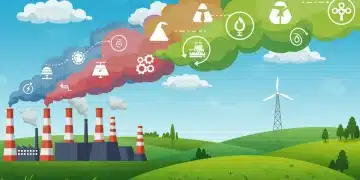Let energy policy discussion shape our future

Future trends in energy policy focus on increasing renewable energy reliance, integrating policies across sectors, fostering community engagement, and achieving energy equity to create a sustainable and effective energy landscape.
Let energy policy discussion play a vital role in shaping our future as we navigate through complex environmental challenges. What if the decisions we make today could significantly alter our tomorrow? Let’s explore the nuances behind these important discussions.
Understanding the current energy challenges
When we talk about understanding the current energy challenges, it’s crucial to grasp just how deeply they impact our daily lives. Energy is a fundamental part of everything we do, from heating our homes to powering our devices. Let’s explore the most pressing issues we face today.
The increasing demand for energy
As the global population continues to grow, so does the demand for energy. More people means more homes, more automobiles, and more electronic devices that need power. This surge in demand places a significant strain on our existing energy sources.
Environmental concerns
One of the biggest challenges comes from the environmental impact of energy production. Fossil fuels, while still widely used, contribute to greenhouse gas emissions. These emissions are a major driver of climate change. It’s essential that we consider cleaner alternatives.
- Transitioning to renewable energy sources.
- Investing in energy efficiency technology.
- Promoting sustainable practices in energy consumption.
Another pressing issue is the aging infrastructure. Many of our energy grids and power plants are over 30 years old, which poses risks for reliability and safety. Modernizing this infrastructure is not only necessary but urgent to support a sustainable future.
The economic implications
Energy challenges also have profound economic implications. Fluctuations in energy prices can impact everything from the cost of living to consumer spending. Businesses that rely on energy-intensive processes may face increased operational costs.
- Investment in new technologies can create jobs.
- Shifting to local energy production can stabilize prices.
- Enhancing energy efficiency can cut down costs for consumers.
Addressing these challenges requires coordinated efforts from governments, businesses, and consumers alike. By working together, we can foster a more sustainable energy landscape that meets the needs of the present without compromising the future.
The role of policy in energy transition
Understanding the role of policy in energy transition is essential as we shift from traditional energy sources to more sustainable options. Policies set the framework that drives innovation and investment in renewable energy. They also shape public perception and can accelerate the transition toward cleaner sources.
Creating a supportive environment
Effective policies can create a supportive environment for renewable energy development. Governments can encourage this shift through incentives such as tax credits and grants. These initiatives help reduce the costs associated with renewable technologies, making them more accessible to businesses and consumers.
- Investment tax credits promote solar energy adoption.
- Renewable energy standards ensure a percentage of energy comes from renewable sources.
- Feed-in tariffs guarantee fixed payments for renewable energy producers.
Moreover, regulations can prevent the harmful impacts associated with fossil fuel use. By enforcing strict environmental standards, policymakers can safeguard public health while promoting sustainable practices.
Encouraging innovation
Policy not only supports existing renewable technologies but also encourages new innovations. By funding research and development projects, governments can help drive technological advancements. This results in better energy efficiency and reduces reliance on fossil fuels.
- Government grants stimulate research in battery storage technologies.
- Funding for clean energy startups can lead to breakthroughs.
- Public-private partnerships can facilitate large-scale renewable projects.
As the energy market evolves, effective policy measures become increasingly important. They guide investments and shape the energy landscape, pushing society to embrace sustainable practices. The collaboration between policymakers, businesses, and the public is vital for a successful energy transition.
Innovative solutions in energy policy

Exploring innovative solutions in energy policy reveals how dynamic approaches can address today’s energy challenges. These solutions not only aim for sustainability but also ensure energy security and economic growth.
Embracing renewable energy technologies
Policymakers are increasingly adopting renewable energy technologies as a core component of energy strategy. By implementing supportive regulations, they create a framework for solar, wind, and geothermal energy to thrive. This allows for a shift away from fossil fuels, promoting a cleaner environment.
- Tax incentives for solar panel installation.
- Grants for wind farm development.
- Funding for research into geothermal energy solutions.
Furthermore, integrating renewable investments with local economies can foster job creation. Communities benefit from new opportunities as they embrace sustainable energy options.
Energy efficiency initiatives
Another focus of policy innovation is enhancing energy efficiency. Policies that promote energy-efficient appliances and buildings help reduce consumption and costs. By encouraging businesses and households to adopt these measures, we can significantly lower greenhouse gas emissions.
- Energy efficiency standards for new buildings.
- Rebates for purchasing energy-efficient appliances.
- Educational programs on energy conservation techniques.
Collaboration between government agencies and private sectors plays a crucial role in promoting these initiatives. Together, they can develop comprehensive strategies that lead to smarter energy use across the board.
Smart grid technology
Implementing smart grid technology represents another breakthrough in energy policy. These systems optimize energy distribution, improving reliability and efficiency. They also facilitate the integration of renewable energy sources and enable users to track their consumption in real time.
Smart grids empower consumers to make informed decisions about their energy use. By embracing advanced technologies, we can lead to a more resilient energy infrastructure that supports sustainability.
Impact of energy policy on the economy
The impact of energy policy on the economy is significant and multifaceted. Energy policies shape the economic landscape by influencing how resources are allocated, jobs are created, and industries develop. Understanding these effects is crucial for making informed decisions about energy strategies.
Job creation and industry growth
One of the most direct effects of energy policy is job creation. As investments increase in renewable energy sources, new industries emerge. For example, jobs in solar panel manufacturing and wind turbine installation have grown substantially due to favorable policies.
- Incentives for renewable energy can boost local economies.
- Training programs help workers transition to green jobs.
- New businesses are established to support energy efficiency technologies.
Encouraging the development of clean technologies not only creates jobs but also stimulates overall economic growth. This shift can attract investment, leading to a more robust economy.
Energy prices and consumer impact
Energy policies also play a role in determining energy prices. For instance, subsidies for fossil fuels may lower costs temporarily but can lead to market volatility. In contrast, investing in renewable energy can result in more stable pricing over time.
- Lower energy costs can increase disposable income for consumers.
- Stability in prices helps businesses plan and invest for the future.
- Long-term investment in renewables can mitigate supply risks.
Furthermore, energy efficiency programs can reduce household energy consumption, translating into savings for families. This alleviates financial pressure and frees up resources for other spending.
Environmental and social implications
Beyond economic factors, energy policy influences environmental outcomes. Sustainable energy practices can significantly reduce pollution, benefiting public health. Healthier communities contribute to a more productive workforce, which further enhances economic performance.
Moreover, addressing issues of energy equity ensures that all demographics have access to affordable energy sources. Policies aimed at improving access can alleviate poverty and improve quality of life.
Future trends in energy policy and sustainability
Exploring future trends in energy policy and sustainability reveals a shift towards innovative approaches that can secure a cleaner, more efficient energy landscape. As global concerns about climate change grow, policymakers are focusing on sustainability to guide energy development.
Increased reliance on renewable energy
One crucial trend is the increasing reliance on renewable energy sources. Policymakers are implementing strategies to encourage investments in solar, wind, and hydropower. These efforts not only aim to cut greenhouse gas emissions but also enhance energy independence.
- Introduction of new incentives for renewable energy projects.
- Development of energy storage technologies to support demand.
- Collaboration between governments and private sectors to advance clean energy initiatives.
Transitioning to renewable energy will likely continue to accelerate as technology improves and costs decrease, making these sources more competitive.
Policy integration and collaboration
Another trend is the integration of energy policy with other sectors, such as transportation and urban development. This comprehensive approach helps create a holistic framework for sustainability. For example, cities are investing in public transportation systems that use clean energy.
- Electric vehicle incentives to promote greener transport.
- Urban planning that prioritizes energy-efficient designs.
- Stronger partnerships between states and regions to share resources.
Through collaboration and integration, policies can better address cross-sector challenges and promote effective solutions.
Community engagement and energy equity
Engaging communities in energy decision-making processes is gaining visibility. Empowering local stakeholders enhances the effectiveness of policies by ensuring that they meet community needs. Energy equity also plays a critical role in future trends, striving to provide access to sustainable energy for all demographics.
Policies focusing on energy equity include making renewable technologies affordable and accessible to low-income households. By promoting equitable access to energy resources, we can achieve more sustainable outcomes.
FAQ – Frequently Asked Questions about Energy Policy and Sustainability
What are the key trends in future energy policy?
Key trends include increased reliance on renewable energy, integration of energy policies with other sectors, and greater community engagement in decision-making.
How does renewable energy benefit the economy?
Renewable energy creates jobs, stabilizes energy prices, and promotes sustainable economic growth, while reducing greenhouse gas emissions.
What role does community engagement play in energy policies?
Community engagement ensures that local needs are met and that diverse perspectives are included in energy decision-making processes.
How can energy equity be achieved in energy policies?
Energy equity can be achieved by providing affordable access to renewable energy technologies for low-income households and underrepresented communities.





